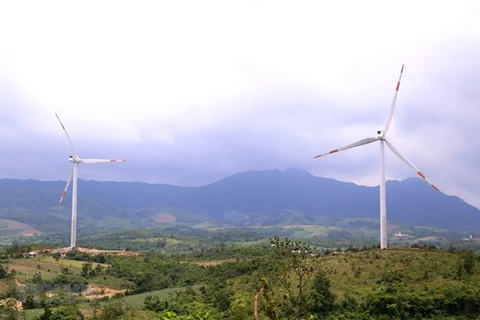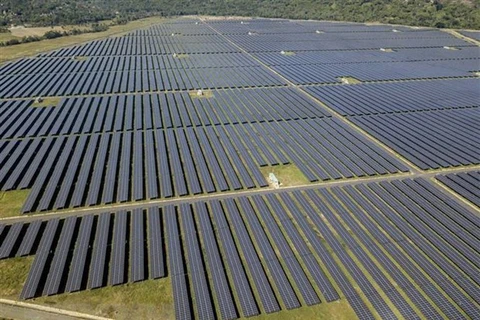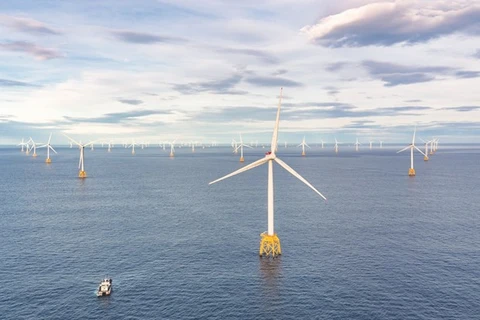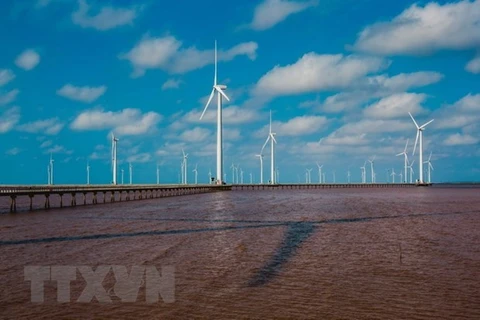Hanoi (VNS/VNA) - Investors from the UK were showing significant interest in investing in renewable energy projects in Vietnam, especially wind power, expecting the Vietnamese Government to introduce long-term support policies as well as simplification of procedures for project implementation.
British Ambassador to Vietnam Gareth Ward said at the UK – Vietnam Renewable Energy Dialogue on Wednesday that clean energy was becoming a global trend, adding that every 1 investment USD in clean energy would help generate from 3-8 USD.
The Vietnamese Government in 2015 approved the renewable energy development strategy to 2030 with a vision to 2050 which aimed to increase the percentage of renewable power from 35 percent in 2015 to 38 percent in 2020 and 43 percent in 2050.
The Government also introduced incentive policies to encourage the development of wind power, biomass energy, energy from waste and solar power.
Hoang Tien Dung, Director of the Ministry of Industry and Trade’s Electricity and Renewable Energy Authority, said developing renewable energy was important in the context that sources for hydropower were being exhausted, thermopower was limited due to commitments to global climate change and gas-fired power had high production costs.
According to the draft national power development planning for 2021-30 period with a vision to 2045, Vietnam had large potential for renewable energy development which was estimated to amount up to 855GW, mostly solar power (434GW), and wind power (375GW). The potential for off-shore wind power was estimated at 158GW.
Off-shore power was attracting increasing interest from foreign organisations and investors, Nguyen Ninh Hai, Head of the Renewable Energy Department under the Electricity and Renewable Energy Authority, said.
Hai said that as off-shore wind power was a new thing to Vietnam, the Ministry of Industry and Trade was cooperating with some research organisations to have a comprehensive evaluation about the off-shore wind power development potential in the country.
Bui Vinh Thang, Director of Mainstream Renewable Power Vietnam, said that the Government’s planning and policies played a very important role for renewable energy investors, especially in wind power and off-shore wind power.
Benjamin Dubas, a representative from Lightsource BP, said that renewable energy investors expected the transparency and stability of policies in the long term to invest in Vietnam, especially feed-in tariffs (FIT).
According to Dung, FIT pricing was applied to accelerate investment in renewable energy in the first stage in Vietnam but this mechanism would not be maintained for a long period and be replaced by competitive bidding when the technology development helped push down prices of solar and wind power.
He added that the national power development planning which was being completed would give priority to renewable energy on the basis of ensuring balance of power sources and the power transmission between regions.
The ministry expected to continue receiving support from the UK in renewable energy, especially off-shore wind power which the UK had experience in and Vietnam had large potential.
By the end of 2020, the total renewable energy output accounted for around 25 percent of the total output worth 69,000MW of the Vietnam’s power system. There were 148 solar power projects with a total capacity of more than 8,800MW, 100,000 rooftop solar power projects with a total capacity of 9,300MW, and 11 wind power projects with a total capacity of 511MW./.
British Ambassador to Vietnam Gareth Ward said at the UK – Vietnam Renewable Energy Dialogue on Wednesday that clean energy was becoming a global trend, adding that every 1 investment USD in clean energy would help generate from 3-8 USD.
The Vietnamese Government in 2015 approved the renewable energy development strategy to 2030 with a vision to 2050 which aimed to increase the percentage of renewable power from 35 percent in 2015 to 38 percent in 2020 and 43 percent in 2050.
The Government also introduced incentive policies to encourage the development of wind power, biomass energy, energy from waste and solar power.
Hoang Tien Dung, Director of the Ministry of Industry and Trade’s Electricity and Renewable Energy Authority, said developing renewable energy was important in the context that sources for hydropower were being exhausted, thermopower was limited due to commitments to global climate change and gas-fired power had high production costs.
According to the draft national power development planning for 2021-30 period with a vision to 2045, Vietnam had large potential for renewable energy development which was estimated to amount up to 855GW, mostly solar power (434GW), and wind power (375GW). The potential for off-shore wind power was estimated at 158GW.
Off-shore power was attracting increasing interest from foreign organisations and investors, Nguyen Ninh Hai, Head of the Renewable Energy Department under the Electricity and Renewable Energy Authority, said.
Hai said that as off-shore wind power was a new thing to Vietnam, the Ministry of Industry and Trade was cooperating with some research organisations to have a comprehensive evaluation about the off-shore wind power development potential in the country.
Bui Vinh Thang, Director of Mainstream Renewable Power Vietnam, said that the Government’s planning and policies played a very important role for renewable energy investors, especially in wind power and off-shore wind power.
Benjamin Dubas, a representative from Lightsource BP, said that renewable energy investors expected the transparency and stability of policies in the long term to invest in Vietnam, especially feed-in tariffs (FIT).
According to Dung, FIT pricing was applied to accelerate investment in renewable energy in the first stage in Vietnam but this mechanism would not be maintained for a long period and be replaced by competitive bidding when the technology development helped push down prices of solar and wind power.
He added that the national power development planning which was being completed would give priority to renewable energy on the basis of ensuring balance of power sources and the power transmission between regions.
The ministry expected to continue receiving support from the UK in renewable energy, especially off-shore wind power which the UK had experience in and Vietnam had large potential.
By the end of 2020, the total renewable energy output accounted for around 25 percent of the total output worth 69,000MW of the Vietnam’s power system. There were 148 solar power projects with a total capacity of more than 8,800MW, 100,000 rooftop solar power projects with a total capacity of 9,300MW, and 11 wind power projects with a total capacity of 511MW./.
VNA
























